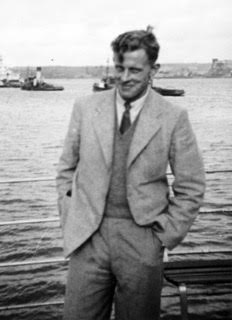A rather sadder commemoration
Regrettably it's not so often nowadays that I write about
affairs on the other side of the pond. But an email from my Massachusetts
correspondent the Rev Sarah Clark reminded me that while we were celebrating 60
years of a British triumph in 2012 with our Diamond Jubilee merrymaking, over
in the USA
There was even a Battle of
the Thames which took place in present-day Chatham ,
Ontario , Upper Canada ,
in 1813, contrasting with our joyful nautical pageant of a few days ago on London
The above hand coloured lithograph depicts the death of the Native American Tecumseh at the hands of the Kentucky
The War of 1812-14, as I learnt from the useful article in Wikipedia at http://en.wikipedia.org/wiki/War_of_1812 is barely remembered in this country. That is because, understandably enough,
It most certainly wasn't a British triumph, and that's probably another reason why we don't talk much about it. The above painting by Anton Otto Fischer depicts the first victory at sea by the USS Constitution over HMS Guerriere.
And here we have the 1910 painting by the American Edward Percy Moran (1862-1935), showing the
Now I agree that there's not much connection here with
But the above poster that I received from the Cape Cod Museum of Natural History in Brewster, promoting a day-long symposium on the War of 1812, made me wonder whether we might see something similar take place in Budleigh in a couple of years' time, supported by our own Museum.
Like, for example, aspects of World War I in so far as they affected life in our town a century ago.
We'll see. It all takes time, planning, and motivation of course.
Anyway, as I said, you can read all about the War of 1812 in the Wikipedia article. There's no mention of shameful massacres, and it seems that the effect of the War was positive in terms of improved Anglo-American relations and the Special Relationship, even if the British left the US Capitol in the terrible state that you see here in this 1814 painting now in the Library of Congress. The British attempted to burn the building and the artist has depicted the fire damage to the Senate and House wings, the damaged colonnade in the House of Representatives shored up with wood to prevent its collapse, and the shell of the rotunda with the facade and roof missing.
Painting by John David Kelly (1862-1958) showing the death of the American General Brock at the Battle of Queenston Heights in 1812
Some of these images taken from the Wikipedia article do show that blood was spilt, and that's a cause for sadness.
So let me end with the cheering if somewhat farcical account
of an episode in the War in so far as it was fought in Cape
Cod . New Englanders were actually against the War, Sarah pointed
out, but had to fight as they were actually attacked in her home town of Rockport
"Our biggest encounter was with the English frigate, Nymph, whose crew came ashore in
September of 1814 and burned our little fort, spiking its three cannon, and
capturing thirteen men. Unfortunately
for the British they got so annoyed at the pealing of our church bell to raise
the alarm that they fired a shot which lodged in the church tower harmlessly
but sank their own boat, causing thirteen British sailors to be captured by the
Rockport Sea Fencibles, who promptly gave them a good breakfast at Huston's Tavern,
then locked them up in an unoccupied house and negotiated with the Captain of the frigate for an exchange of prisoners,
which took place the next day.
"The British sailors reported that they had been well
fed, well housed, well treated, and even enjoyed conversation with some pretty
girls. As a result the captain of the frigate promised not to attack Rockport
again and to let the fishermen fish unmolested, which promise he kept.
"Would that all war stories could have such happy
endings!" concludes Sarah.









Comments
Post a Comment